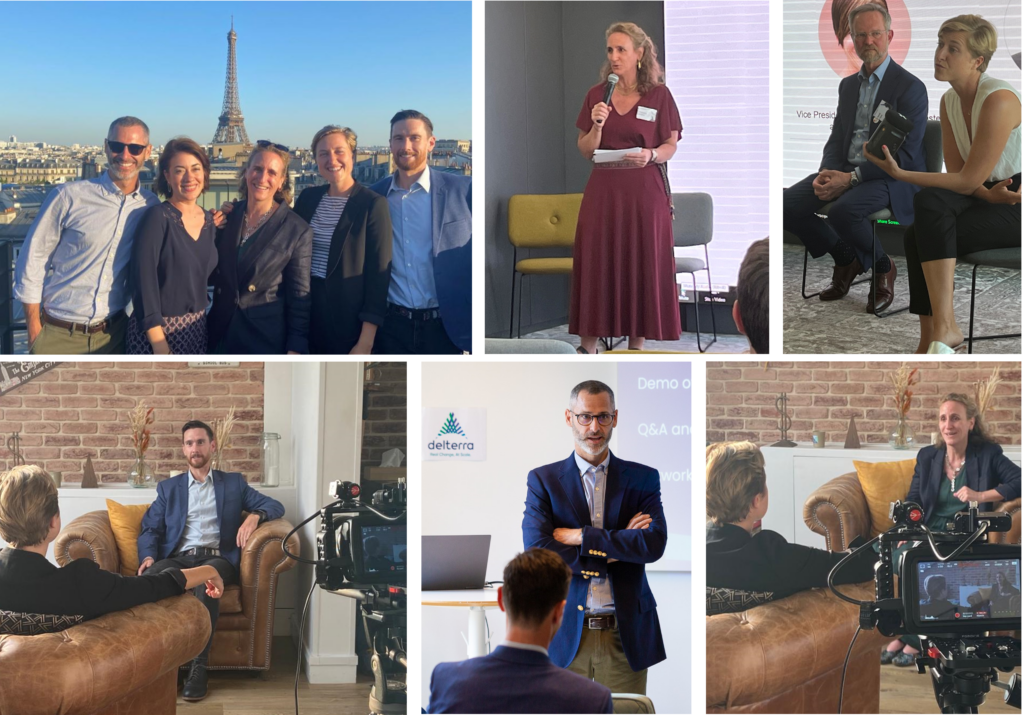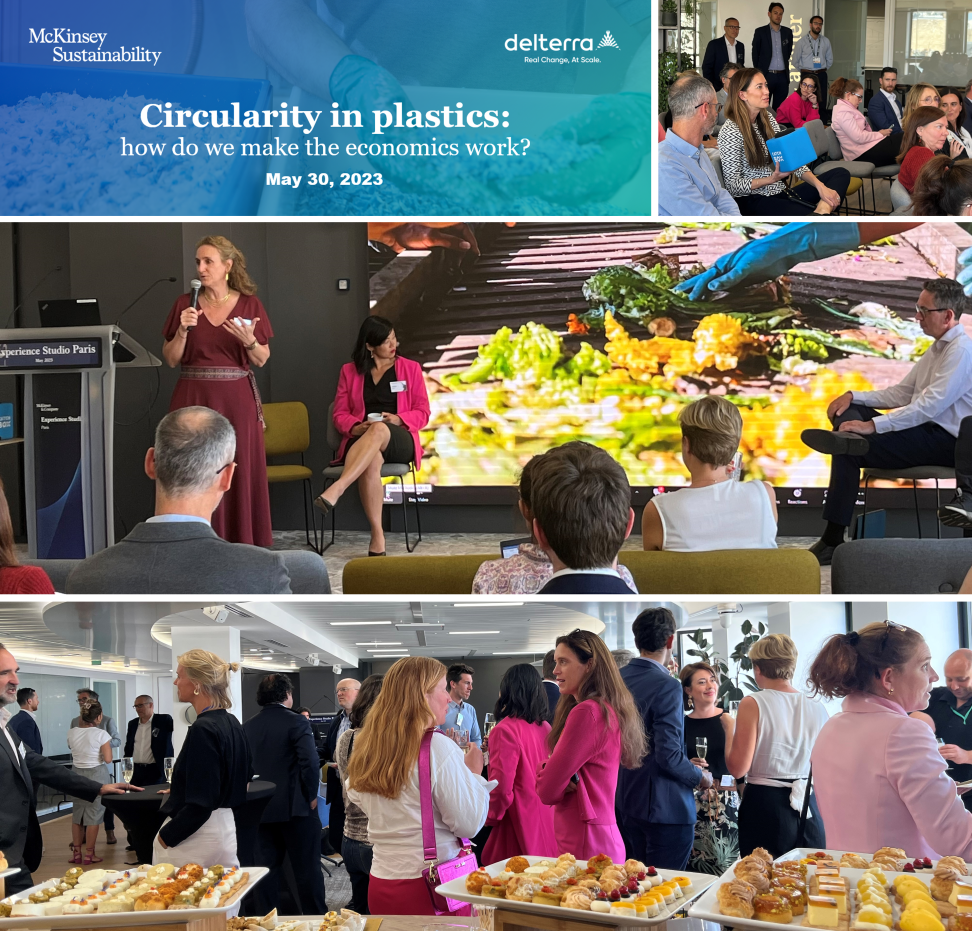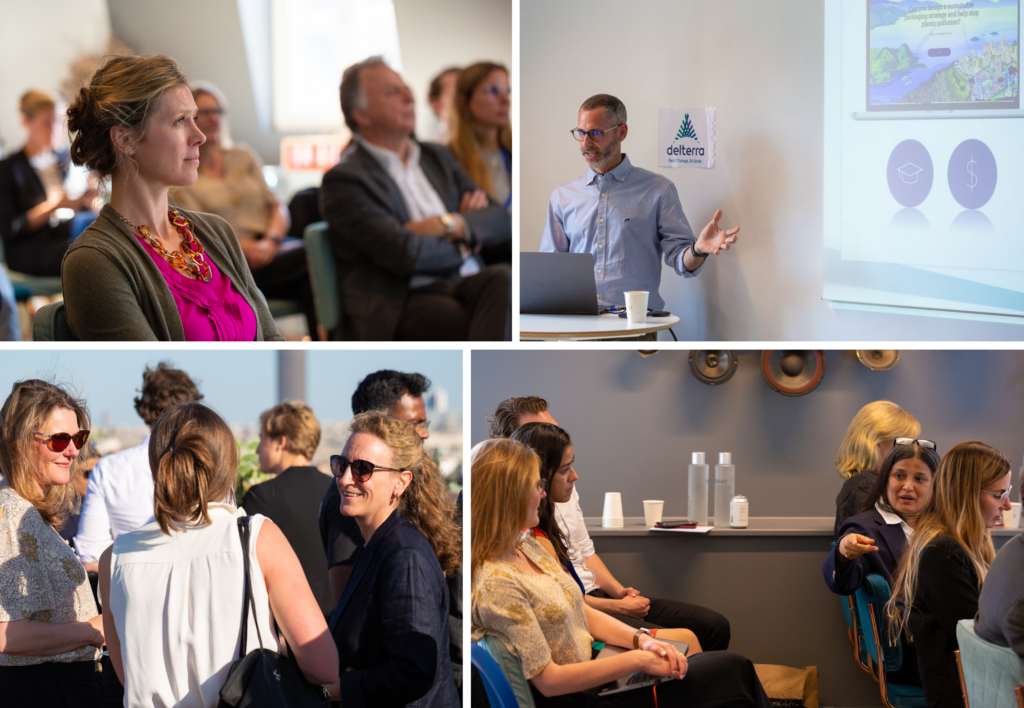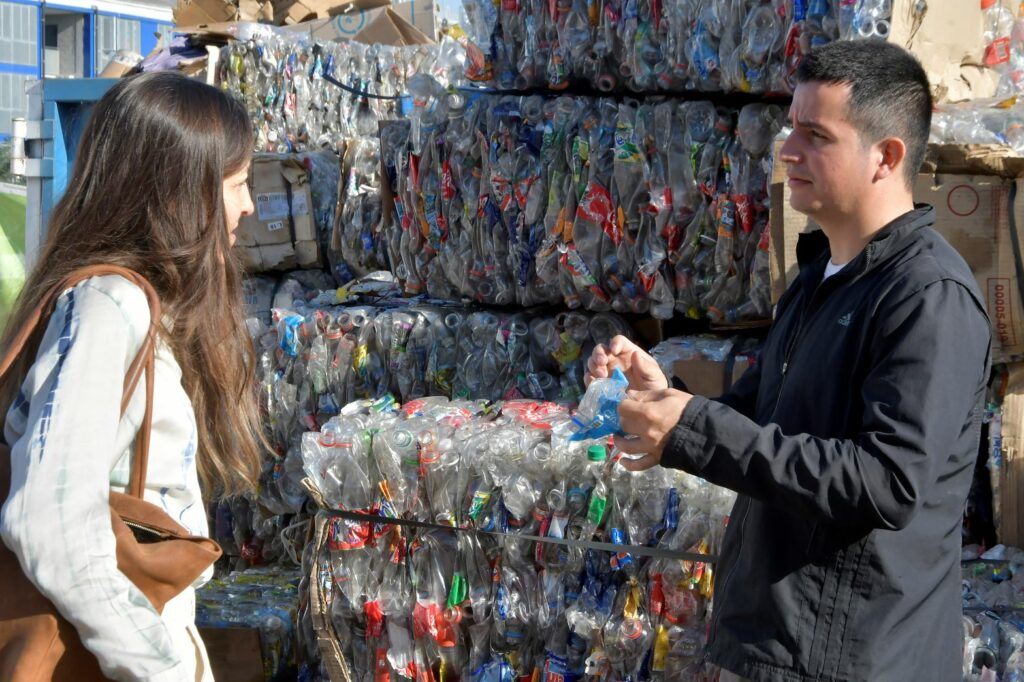The international community gathered in Paris last week, where over 1,700 delegates from nearly 170 countries converged to negotiate a UN global treaty to beat plastic pollution. This treaty is a historic, once-in-a-generation opportunity to solve the plastics crisis and shape the world we want tomorrow.
The aim for this second session of intergovernmental negotiation (INC-2)? To agree to ink the zero draft of the treaty text. This iteration will be negotiated at INC-3 in Kenya, and with just five months until the next session, it really is time to put pen to paper.
 📷 Photos by IISD/ENB | Kiara Worth
📷 Photos by IISD/ENB | Kiara Worth
As a UNEP accredited environmental nonprofit, Delterra was delighted to participate in the discussions, both at the UNESCO venue and at a host of side events throughout the week. Here in Paris, I was thrilled to be joined by Delterra colleagues Shannon Bouton, President & CEO; Jeremy Douglas, Director of Partnerships; Mike Stockman, Director of Plastic IQ; and Ella Flaye, Director of People.
It was encouraging to see a high level of ambition at the meetings and we are happy to report on an intense and productive week, filled with valuable conversations, connections and new collaborations. Here is a brief collection of what we heard, saw and said in Paris!

“Make Paris count”
At the outset of the week, executive secretary Jyoti Mathur-Filipp, appealed to participating member states to “make Paris count.” As it turned out, there would be a few procedural obstacles to overcome first. “Getting 170-plus countries to agree on a global treaty to fight plastic pollution was never going to be easy. But negotiators didn’t think clearing the first hurdle would be this hard,” writes Leonie Cater in Politico.
“After a week of negotiations, the world is one step closer to the unmissable opportunity of a global treaty to end the plastic pollution crisis,” said Marco Lambertini, WWF Special Envoy in a press release. “The first draft of the treaty that will now be developed must reflect the ambition shown by the vast majority of countries here in Paris and include the global bans and control measures that are needed to reduce and eliminate production and consumption of unnecessary and harmful plastic products and materials and turn the tide on plastic pollution.”
 📷 Photos by IISD/ENB | Kiara Worth
📷 Photos by IISD/ENB | Kiara Worth
“Progressive businesses want an ambitious global legally binding treaty”
“Voluntary action by individual companies and their leaders can only ever be one part of the solution,” said Mark Schneider, Chief Executive Officer at Nestlé and Antoine de Saint-Affrique, Chief Executive Officer, Danone on the WEF blog calling for cohesive regulation to tackle plastic pollution.
The Business Coalition for a Global Plastics Treaty, of which Delterra is an NGO member, said in a statement, “We believe that legally-binding global rules and harmonized policies are critical to drive change at a global scale to end plastic pollution. We are greatly encouraged that more than 130 member states have specifically called for binding rules that will create a level playing field for all businesses.”
“The question is no longer why, but how”
Alongside our Founding Partner McKinsey & Company, Delterra was thrilled to bring together around 40 senior leaders from international companies, NGOs and institutions for open discussions around the future of circularity in plastics and the implementation of sustainable packaging commitments.
“Last year, 175 countries adopted a resolution to create a legally binding agreement by the end of 2024 to end plastic pollution,” Shannon commented while opening the roundtable event. “Just as state decisions are crucial to move things forward, businesses also have a huge role to play. For companies, the question is no longer why reduce plastic waste pollution, but how. Collaboration across the value chain will be key.”

“There is a lack of funding for infrastructure in the Global South”
The key to developing scalable solutions that work is to find what is universally true and what is culturally unique. When a region’s economy advances faster than its waste management and recycling infrastructure, we need to start by understanding the region and then tailor solutions to the local context that will transform the system in a way that is suited and sustainable to that region and can eventually be owned and run by the community.
“The big challenge in bringing the circular economy to the Global South is lack of funding for waste management and recycling infrastructure,” Shannon told Forbes in an interview. “This means materials that are technically recyclable are not being recycled simply because the factories do not exist to process them. Governments have other more pressing concerns, so taking on more debt to fund waste is not a top priority. It’s also not attractive enough for private investors to make a return because there is too much system building to do before projects become bankable.”
“Recycling alone is not enough to #BeatPlasticPollution”
Together with our partners at Systemiq, Delterra hosted a roundtable on designing a system free of plastic waste with the help of Plastic IQ, an open-source digital platform created by Delterra, The Recycling Partnership and Systemiq, with support from Walmart giving.
Presenting at the event, Mike said “This is a free-to-use suite of digital tools that allows companies to better understand the environmental and economic impact of their current plastic footprint, increase their knowledge on how to improve that impact, determine the most effective plastic footprint reduction strategy, and accelerate their transition to a circular economy.”
Thank you to attendees, including many Business for a Plastics Treaty members, for the insightful conversations and for advocating for production of less plastic, circulation of materials, remediation of leaked materials, and sustainable livelihoods for formal and informal waste workers.

“Plastic pollution is a symptom of a broader issue of underperforming or non-existent waste management and circularity solutions”
“A truly effective agreement will look beyond plastics,” argue Jeremy and Shannon in an op-ed for The Economist. In fact, plastic pollution is a symptom of a bigger problem, the way the world manages all of its waste – not just plastics. At Delterra, we firmly believe that in order to solve the global waste crisis, we need to look at the full value chain.
“Solving plastic pollution – and indeed the broader waste crisis, requires a rethinking of the way we produce and manage waste,” said Shannon in a press release that has since been picked up in 66 media outlets and covered by 26 titles, including GreenBiz, Recycling Today, Sustainability Magazine and Forbes.
“We are thrilled to be partnering with Amcor, Mars and P&G on our joint mission of eliminating waste in the environment. We are inspired that these organizations are stepping up to this challenge alongside Delterra and we invite more companies to join this growing partnership.”
“This partnership of leaders from the packaging value chain will make a real difference in creating a circular economy for packaging and eliminating plastic waste from the environment, said David Clark, Vice President of Sustainability at Amcor.
“We want to demonstrate that we can create successful programs for waste management and recycling systems particularly in the Global South, that currently lacks the infrastructure we need to stop plastic pollution,” said Allison Lin, Global VP Packaging Sustainability at Mars.
“It will take the entire value chain – including businesses like P&G – to prove out new circular business models while improving waste management,” said Stacie Hecht, Packaging & Waste Leader, Global Sustainability at Procter & Gamble.

Between INCs: What happens between Paris and Nairobi?
The outcome of this ongoing negotiation will impact generations to come. What an honor it is to be part of this movement to #BeatPlasticPollution and thank you to all those who joined Delterra in these important discussions and who are partnering with us to tackle the broader waste crisis and develop truly sustainable circular economies.
Much remains to be done and every moment is critical for the planet. We invite you to join our growing partnership on a mission to create real change – on the ground, at scale and with urgency. Now is the time to design the world we want for future generations!
We invite you to connect with us with your thoughts and suggestions, or to learn more about partnership opportunities. Beyond that, we hope to see you in upcoming meetings such as those at New York Climate Week or INC-3 in Kenya. Until then, we encourage you to get inspired and stay updated on Delterra’s real world insights and practical actions for a circular economy.
 This blog was written and contributed by:
This blog was written and contributed by:
Lisa Prévert
Communications Lead
Delterra
Get in touch
Suggested Further Reading:
- Reuters: After rough start, UN plastic treaty talks end with mandate for first draft
- WWF: UN Plastic Pollution Treaty ‘one step closer’ to being realised, as negotiators in Paris agree to start developing a draft treaty with global rules to curb plastic pollution
- France Diplomacy: Towards a global treaty to end plastic pollution – Progress report on the week of negotiations
- Politico: Global plastic treaty talks limp on despite blockade by oil-rich countries
- Edie: Plastics treaty: Nations agree to publish draft this year
- IISD: INC-2 Daily reports, Highlights and Photos
📷 Feature image: photo by IISD/ENB | Kiara Worth
